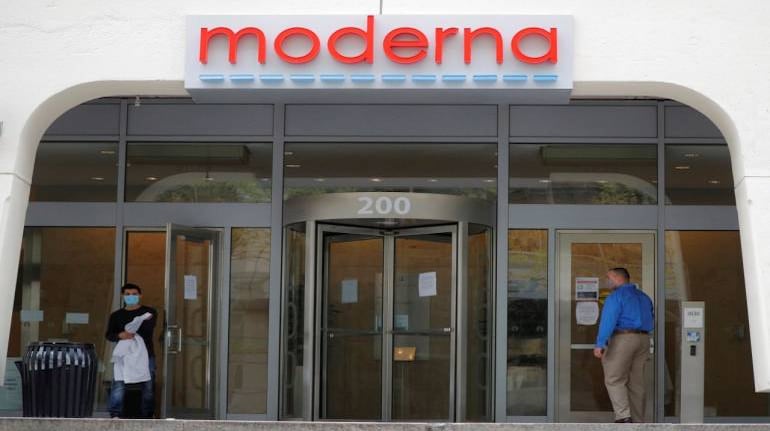Moderna is enrolling 30,000 people as part of its phase-3 clinical trial, which is expected to be completed later this month and if all goes to plan, it may launch the vaccine by year-end.
Moderna Therapeutics that has emerged as the frontrunner in the race for a coronavirus vaccine is in talks with several countries for a possible rollout of the much-awaited jab, the US-based biotech company has told Moneycontrol.
The company said it was committed to “equitable access” to its vaccine candidate but declined comment on a possible plan for a launch in India or a tie-up with Indian companies to distribute the vaccine.
“We are in ongoing conversations with a number of countries around the world for Moderna’s investigational vaccine mRNA 1273,” Moderna spokesperson said in an email to queries about its plans for India.
“At this stage, we cannot disclose any further details,” the statement added.
Spotlight is back on the company after the British drugmaker AstraZeneca earlier this week paused phase-3 clinical trials of its vaccine after suspected adverse reaction in a participant in the United Kingdom.
On September 10, Serum Institute of India, too, put on hold trials of AstraZeneca's vaccine, developed with the University of Oxford, in the country.
Drugmakers are racing to come out with a vaccine to contain the pandemic that has known to have sickened more than 28 million across the world and killed at least 904,000 people.
India, too, is seeing a surge in cases, with daily infections hovering close to 100,000-mark. The country now has at least 4.5 million confirmed Covid-19 cases, including 76,271 deaths.
“We remain committed to making sure we have timely, affordable and equitable access for our candidate vaccine to ensure a global response to the pandemic,” it said.
COVID-19 Vaccine Watch: All you need to know about the vaccine’s manufacturing and pricing
Since it was founded in 2010, Moderna had worked to build the industry's leading mRNA technology platform, the Massachusetts-based biotech company said.
Moderna became one of the first companies to take a Covid-19 vaccine into a phase III clinical trial, which tests the safety and efficacy of a drug or a jab.
The company, which was little known until it announced a successful phase-1 trial earlier this year, is in the process of enrolling 30,000 people for the Phase-3 trial, expected to be completed later this month.
The results will be announced in October and if successful, a rollout by year-end.
Moderna said earlier that smaller volumes of its experimental vaccine have been priced at $32-$37 (Rs 2, 354-2,722) per dose.
Follow our LIVE blog for the latest updates of the novel coronavirus pandemic
Silent on India
Moderna remains tight-lipped on India, which has the second-highest number of Covid-19 cases in the world and is also one of the biggest vaccine-makers.
Companies such as AstraZeneca, Novavax, Johnson & Johnson have announced partnerships with Indian companies such as Serum Institute of India and Biological E to manufacture and distribute vaccines in India.
Moderna’s method of producing vaccine differs from conventional manufacturers and it may not require the expertise that Indian companies offer.
The company’s vaccine uses genetic material called messenger RNA to instruct body’s cells to make viral proteins that induce an immune response.
The vaccines that are in the market now contain weakened or inactivated disease-causing viruses or proteins called antigens, which work by mimicking the infectious microbe. Once the vaccine is injected, it activates the body’s immune system and issues instructions to produce antibodies.
Conventional vaccines are complex to produce. The organism or the protein of choice has to be cloned first, which is time-consuming and expensive.
The advantage of mNRA method is that it helps to develop and produce vaccines rapidly at scale. These vaccines are safer as they don't use any live or inactivated viruses.
Also read: Explained: Is Moderna's vaccine for COVID-19 worth the hype?
Moderna earlier said it was on track to deliver around 500 million doses per year, and possibly up to 1 billion doses per year from 2021 because of the company’s US manufacturing capabilities and strategic collaboration with Switzerland-based Lonza.
Recently, the company also announced a tie-up with US-based Catalent for large-scale, commercial fill-finish manufacturing of mRNA-1273 for the US and with ROVI of Spain for other countries.
Moderna, which has never brought a vaccine in the market, has received nearly $1 billion from the US government under its Operation Warp Speed programme that is funding several coronavirus vaccine candidates.

_2020091018165303jzv.jpg)






